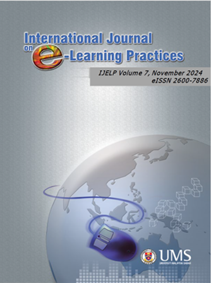EXPLORING THE IMPACT OF USING WEBLOG AS A TOOL TO ENHANCE SECONDARY SCHOOL STUDENTS’ WRITING PROFICIENCY IN MALAYSIA
DOI:
https://doi.org/10.51200/ijelp.v7i1.5417Keywords:
ESL, weblog, writing proficiency, secondary education, students perceptionsAbstract
The purpose of this research is to evaluate the effectiveness of weblogs in teaching English writing skills to the secondary school students in Malaysia and to determine the students’ attitude towards the use of weblog in improving their writing abilities. In this study, the researcher interviewed nine Form 2 students who were selected at random and through face-to-face interviews the researcher asked them about their perceptions on the topic. The findings suggest that the use of weblogs enhances students’ writing skills and achieve higher results in grammar, writing structure and the use of the appropriate vocabulary. Students admitted they benefited from the feedback given through weblogs as it assisted them in enhancing their writing and also creativity with a view of writing more. Application of weblog in learning was effective and the feedback and interaction significantly helped in learning. Based on the study, it is possible to use weblogs in teaching English language with a focus on writing with proper support and supervision from the teachers. More studies should be conducted to establish weblog use in education in the long-run.
References
Ali, S. N. (2012). Malaysian Polytechnic Lecturers’ Teaching Practices with ICT
Utilization to Promote Higher-Order Thinking Skills. https://doi.org/10.31274/etd-180810-1791
Campbell, A. P. (2003, February). Weblogs for Use in ESL Classes. The Internet TESL
Journal. http://iteslj.org/Techniques/Campbell-Weblogs.html
Che Musa, N., Koo, Y. L., & Azman, H. (2012). Exploring English Language Learning
And Teaching In Malaysia. GEMA OnlineTM Journal of Language Studies, 12(1). https://core.ac.uk/download/pdf/11492256.pdf
Eastment, D. (2005). Blogging. ELT Journal, 59(4), 358–361
https://doi.org/10.1093/elt/cci073
Ebrahimi, S. S., & Yeo, K. J. (2018). The Use of Technology at Malaysian Public
High Schools . Merit Research Journal of Education and Review, 6(3), 054–060. Merit Research Journals . https://www.researchgate.net/publication/324279780_The_Use_of_Technology_at_Malaysian_Public_High_Schools
Galien, P., & Bowcher, W. L. (2010). Using Blogs in ESL/EFL Teaching and Teacher-Training.
Asian EFL Journal, 42. http://www.asian-efl-journal.com
Hyland, K. (2003). Second Language Writing. Cambridge University Press
Jo, S. F. (2013). ICT in Education: A Critical Literature Review and Its Implications.
International Journal of Education and Development Using Information and Communication Technology (IJEDICT), 9(1), 112–125. https://files.eric.ed.gov/fulltext/EJ1182651.pdf
Kementerian Pendidikan Malaysia. (2013). Malaysia Education Blueprint, 2013-2025
: Preschool to Post-Secondary Education. Kementerian Pendidikan Malaysia.
Mohamad, M., Ghazali, N., & Hashim, H. (2018). Secondary School Students’
Perceptions on the Use of Google+ towards Improving ESL Writing Skills. International Journal of Emerging Technologies in Learning (IJET), 13(09), 224. https://doi.org/10.3991/ijet.v13i09.8479
Perumal, K., & Ajit, I. (2022). A Descriptive Study on the Effect of Blogs on Writing
Skill Development Using Social Constructivism as a Theory. Theory and Practice in Language Studies, 12(8), 1537–1544. https://doi.org/10.17507/tpls.1208.09
Simmons, C., & Hawkins, C. (2009). Teaching ICT. Sage
https://www.academia.edu/5663269/Teaching_ICT_By_Carl_Simmons_and_Claire_Hawkins
Sun, Y. (2010). Extensive writing in foreign‐language classrooms: a blogging
approach. Innovations in Education and Teaching International, 47(3), 327–339. https://doi.org/10.1080/14703297.2010.498184
Termit, K., & Ganisha, V. (2014). Teachers’ Uptake on ICT Integration in Teaching
and Learning – A Case of Malaysian Teachers. SOCIAL SCIENCES & HUMANITIES, 22(4). Pertanika Journals.
Tran, H. T. (2009, November 17). The interaction hypothesis: A literature review .
Alliant International University .https://files.eric.ed.gov/fulltext/ED507194.pdf
UNESCO's International Institute for Educational Planning. (2017). Information and
communication technologies (ICT) | Unesco IIEP Learning Portal. Unesco.org. https://learningportal.iiep.unesco.org/en/glossary/information-and-communication-technologies ict#:~:text=Definition,create%2C%20share%20or%20exchange%20information.
Williams, J. D. (2014). Preparing to Teach Writing: Research. Williams, Theory and
Practice.Routledge. https://www.researchgate.net/publication/259891995_Preparing_To_Teach_Writing_Research_Theory_and_Practice_4th_edition_2014






